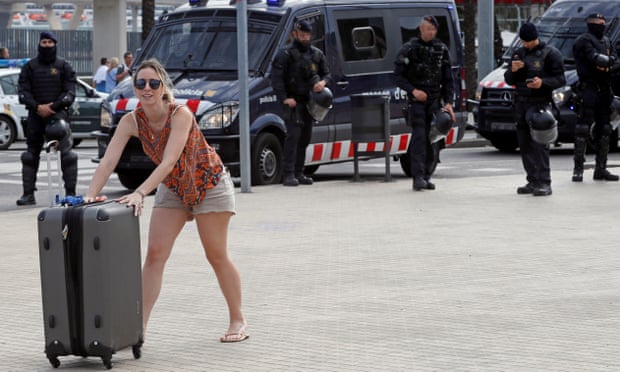Still reeling from the collapse of Thomas Cook, Spain’s tourist industry is now counting the cost of prolonged rioting in Barcelona, the nation’s most popular urban destination.
A week of violent and destructive disturbances over the jailing of Catalan political leaders left the city with a clean-up bill estimated at €3m but it is feared that the images of airport chaos, running battles with police and flaming barricades will cost the city a great deal more.
The tourism association Barcelona Oberta estimates that economic activity in the city centre – principally the retail and hospitality sectors – fell by between 30-50% during the week after the sentences were announced on 14 October, either because clients stayed away to avoid being caught up in the violence or because establishments closed for fear of damage or looting.
Roger Pallarols, president of the Barcelona restaurateurs association, said that in the areas directly affected by the disturbances trade fell by about 60%. Some 70 restaurants also had their outdoor terraces destroyed as rioters burned chairs and parasols on the barricades, causing around €2m in damage to property.
“Last week was a lost week from the point of view of restaurateurs,” Pallarols said. “Things are quiet now but if this continues restaurants will have to lay off staff because the profit margins are very small.”
Some of the worst rioting was in Passeig de Gràcia, the city’s upmarket shopping street, where around 60% of sales are to tourists.
“Sales were down around 30% over the week,” said Luis Sans, president of the Passeig de Gràcia association. “We’re seeing a return to normality now but the short term is one thing, another is the effect these images will have had on people’s desire to come to Barcelona.
“There was a lot of damage but at least, unlike the gilets jaunes in Paris, the demonstrators didn’t set out to destroy shops and restaurants.”
Manel Casals, head of the Barcelona hoteliers association, said there have been cancellations but relatively few, although he has no figures as yet. “What we are seeing is fewer people are making reservations than is normal at this time of year.”
The same is happening with Airbnb and other holiday apartment platforms. According AirDNA, which analyses the short-term rental market, reservations for the week from 14 October, when the protests began, were down by nearly 1,000 on the same week last year, from 12,515 to 11,537.
Tourism accounts for 15% of Barcelona’s GDP and the hotel business alone has a turnover of some €1.6bn. The tourism industry employs around 100,000 people, 40,000 of them directly.
As well as tourism, Barcelona is one of the world’s favourite conference venues. There are conferences every day of the week but the real money-spinner is the Mobile World Conference. Last year the 100,000 visitors to the congress spent €473m while creating 14,000 temporary jobs. The current contract with the city expires in 2023.
“Conferences are organised a long way in advance and aside from an American convention I don’t know of any cancellations,” said Christoph Tessmar, director of the Barcelona Tourism Convention Bureau. “In recent years Barcelona has had to confront major crises but has maintained its position as a world leader for conferences, although the images we’ve seen in recent days could have a negative impact in the short term.”
Barcelona is also the cruise capital of the Mediterranean. At least three cruise ships carrying a total of 6,000 passengers opted not to dock in the city during the disturbances. However, the financial impact will have been felt more by the port authorities than the city as cruise passengers spend little when they go ashore.
According to the government, ports, railways and airports between them have lost about €4m as a result of the protests. Altogether, around 175,000 travellers were affected either by cancellations or delays caused by road blocks.
For now, everyone is banking on Barcelona’s famed capacity for resilience. During the crisis in 2017, when the city was rocked by both a terrorist attack and the illegal declaration of independence, thousands of businesses moved their headquarters out of Catalonia. However, the city bounced back and Sans believes that the political uncertainty in 2017 made the situation worse than it is now.
“These events can damage the city’s image but this conflict isn’t going to continue forever and we’ll get back to normal,” said Gabriel Jené, president of Barcelona Oberta. “We’re more worried about the ability of politicians to deal with the conflict than the capacity of the city to overcome it.”








































admin in: How the Muslim Brotherhood betrayed Saudi Arabia?
Great article with insight ...
https://www.viagrapascherfr.com/achat-sildenafil-pfizer-tarif/ in: Cross-region cooperation between anti-terrorism agencies needed
Hello there, just became aware of your blog through Google, and found ...